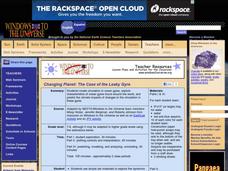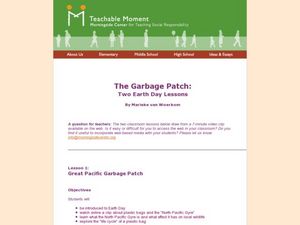Curated OER
Changing Planet: The Case of the Leaky Gyre
The fascinating video "Changing Planet: Fresh Water in the Arctic," introduces your oceanographers to the world's gyres. They learn that melting sea ice is making the gyres larger, and that the changes could, in turn, contribute even...
Curated OER
Oceans: Water, Water Everywhere. . . but Only on the Earth!
It's not long, but it's thorough! This PowerPoint takes 4th - 8th grade earth scientists deeper into the oceans. They learn about tide and current activity and the forces that drive them. They also discover how wind and the rotation of...
Curated OER
Message in a Bottle - A Satellite Journey through the Gulf Stream
The Gulf Stream has historically provided humans with a faster trade route because of its swift-moving waters. It continues to be a source of information and fascination for oceanographers today. As your class views this collection of...
Curated OER
Charleston Bump Expedition Eddies, Gyres and Drowning Machines
Students describe at least three types of effect that physical obstructions may have on water flowing past the obstructions. Students explain at least three ways in which current flow can be significant to benthic organisms.
Curated OER
Wind Circulation, Surface Currents and Climate
High schoolers describe connections between wind patterns, surface currents, and ocean climate zones. In small groups, they color the ocean climate zones in four different shades of blue. Students then answer questions like what four...
Curated OER
El Niño ~ The Return of El Niño
El Niño sure creates a stir when it comes around! Why not stir up your earth science class with this data analysis activity that examines the temperature and precipitation over the 2002-2003 water year. A tracking chart is provided...
K12 Reader
Jabberwocky
Readers demonstrate their ability to use word endings and word relationships to identify the parts of speech of the nonsense words in Lewis Carroll's "Jabberwocky."
Central Oregon Community College
Things Fall Apart Study Guide
“There is no story that is not true.” And Chinua Achebe’s Things Fall Apart, uses proverbs (“. . .the palm-oil with which words are eaten”), a compelling tragic hero, and historic events, to engage readers in the truth of his story of...
Curated OER
Vocab-u-lous! Build a Fabulous Vocab
In this vocabulary worksheet, students decipher which word would complete the sentence best. All words begin with the letter "G."
Curated OER
Jabberwocky-Identifying Adjectives
Elementary learners identify adjectives in sentences. They read the poem "Jabberwocky" by Lewis Carroll and highlight the adjectives. A good supplemental instructional activity if you are studying Lewis Carroll and/or "Jabberwocky."
Curated OER
Iron Fertilization - Pumping Iron
The theory that adding iron to ocean water may increase phytoplankton ability to remove carbon dioxide from the atmosphere is examined. The Monterey Bay Aquarium Research Institute is monitoring conditions off the California coast to...
Houston Teachers Institute
Alice in Wonderland: Nonsense and Logic in Literature
Alice's Adventures in Wonderland is known for its fantastical imagery and nonsense verse. This unit plan offers a basic exploration into nonsense verse through poetry and teacher read-alouds. It incorporates activities involving poetry...
Curated OER
Rubber Duckies and Ocean Currents
Students explore marine life by conducting a rubber duck experiment. In this water currents lesson plan, students practice identifying latitude and longitude coordinates on a map and define the currents of major oceans. Students discuss...
Curated OER
The Garbage Patch: Two Earth day Lessons
Students view a seven minute video called Gorilla in the Greenhouse. In this Earth day lesson, students review the history of Earth day. Students work in groups to describe the life cycle of a plastic bag. Students understand that...
Curated OER
Scientific Method in Action
Students investigate the current environmental movement by cleaning up their own campus. In this environmental care lesson, students practice cleaning their "environment" by picking up trash on their campus and decrease litter by adding...
Curated OER
Debris Dilemmas
Learners examine debris, what it is, where it comes from and where they go. In this debris lesson students view a video, answer questions and discuss what they learned.
Curated OER
You Are What You Eat: Plastics and Marine Life
Students study the different types of plastics and see which ones sink or remain buoyant. In this ocean environmental instructional activity students complete several handouts, and view a film on PBS.
Curated OER
Tides and Currents
Students research and describe how currents are formed. In groups, they relate specific terms to the formation of currents and locate different currents on a world map. They also examine tides, how they are formed and how they are...
Curated OER
Ocean Currents Quiz
In this ocean worksheet, students complete a 13 question multiple choice on-line interactive quiz about ocean currents. Prior knowledge is assumed.
Curated OER
What is Climate?
Students explore the differences between climate and weather. In this introductory lesson of a climate unit, students discuss the vocabulary and concepts associated with weather and climate. They build their information base for the...
Curated OER
What's in that Cake?
Young scholars discover the methods scientists use to investigate Oceanic habitats. For this oceanography lesson, students utilize the Internet to identify deep sea submersibles and how they help scientists study the Charleston Bump....
Curated OER
Major Ocean Surface Currents
Students investigate wind driven surface currents and prevailing winds by playing a card game. The cards are sorted by north or south and Atlantic or Pacific. They then predict where the two currents are found and what their...























